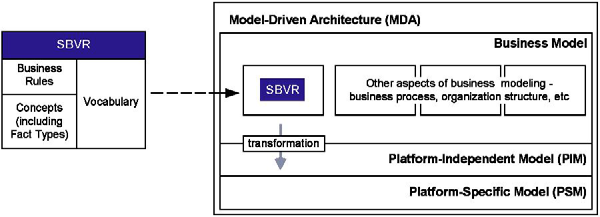Notice: This Wiki is now read only and edits are no longer possible. Please see: https://gitlab.eclipse.org/eclipsefdn/helpdesk/-/wikis/Wiki-shutdown-plan for the plan.
MDT/SBVR
Contents
Overview
SBVR is an open source component of the Model Development Tools (MDT) subproject to provide a metamodel implementation and sample tools based on the adopted Semantics of Business Vocabulary and Business Rules (SBVR) OMG specification. SBVR defines the vocabulary and rules for documenting the semantics of business vocabularies, business facts, and business rules; as well as a CMOF metamodel and corresponding XMI serialization for exchanging business vocabularies and business rules among organizations and between software tools. The term "business" in the SBVR specification does not limit its applicability to business applications, but it may be used by any activity that benefits from formal definition of terminology and rules.
SBVR is positioned to be entirely within the business model layer of the OMG’s Model Driven Architecture (MDA).
A business vocabulary contains all the specialized terms, names, and fact type forms of concepts that a given organization or community uses in their talking and writing in the course of doing business. The SBVR "Vocabulary for Describing Business Vocabularies" is based on the ISO terminology standards:
- ISO 704 (2000) "Terminology work – Principles and methods" [ISO704]
- ISO 1087-1 (2000) "Terminology work – Vocabulary – Theory and application" [ISO1087-1]
These standards have been used for many decades for multilingual correlation of vocabularies in support of language translation work. SBVR is the result of the integration of these ISO standards, formal logics, linguistics, and practical experience from foremost practitioners in the field of business vocabulary for business rules. They have over ten years experience in the development and application of the applied techniques included in the SBVR approach.
SBVR is also based on "fact-oriented" modeling. Fact-oriented modeling is a conceptual, natural language based approach to modeling and querying the information semantics of business domains in terms of the underlying facts of interest, where all facts and rules may be verbalized in language readily understandable by users of those business domains. Unlike Entity-Relationship (ER) modeling and UML class diagrams, fact-oriented modeling treats all facts as relationships (unary, binary, ternary etc.). How facts are grouped into structures (e.g. attribute-based entity types, classes, relation schemes, XML schemas) is considered a design level, implementation issue that is irrelevant to the capturing of essential business semantics.
A business vocabulary provides a means of recording and communicating facts. Following OMG’s Model Driven Architecture, a business vocabulary developed as an information system independent model of business communication is used to drive the creation of a platform independent MOF model. The MOF model is, in turn, used to drive generation of a Java API (based on EMF) and XML Schemas.
SBVR Project Links
SBVR Wiki
- SBVR 0.7 Project Plan lists committed and proposed plan items with corresponding bugzilla links.
- Semantics of Business Vocabulary and Business Rules (SBVR) 1.0 specification
- SBVR Tools Metamodel describes the SBVR metamodel used for tool development.
- SBVR Exchange Metamodel describes the SBVR CMOF metamodel used to load and save XMI serialization files compliant with the SBVR specification.
- SBVR component proposal (archived copy of original proposal for this project)
Other SBVR Resources
- Sjir Nijssen, SBVR: Semantics for Business, Business Rules Journal, Vol. 8, No. 10 (Oct. 2007).
- Donald Chapin, SBVR: What is now Possible and Why?, Business Rules Journal, Vol. 9, No. 3 (Mar. 2008).
- John Hall, SBVR Overview (PowerPoint), Metadata Open Forum, July 2007.
- Fact-oriented analysis using Object-Role Modeling (ORM), see The ORM Foundation
Eclipse Site and Wiki
Feedback
Please give your feedback using any of the following mechanisms
- Bugzilla
- Add a new enhancement request
- Comment on existing enhancement requests
- Newsgroup eclipse.modeling.mdt, use [SBVR] subject prefix
- Developer mailing list mdt-sbvr.dev@eclipse.org

